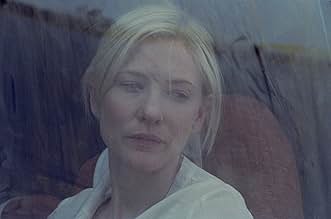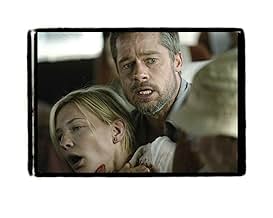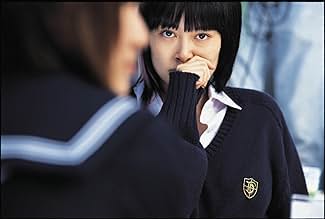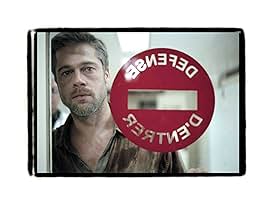A tragédia atinge um casal em férias no deserto marroquino, dando início a uma história entrelaçada que envolve quatro famílias diferentes.A tragédia atinge um casal em férias no deserto marroquino, dando início a uma história entrelaçada que envolve quatro famílias diferentes.A tragédia atinge um casal em férias no deserto marroquino, dando início a uma história entrelaçada que envolve quatro famílias diferentes.
- Direção
- Roteiristas
- Artistas
- Ganhou 1 Oscar
- 45 vitórias e 137 indicações no total
Avaliações em destaque
Alejandro González Iñárritu's direction is brilliantly layered and intricately woven. He deftly uses different film stock, imagery, sound, and stories to weave a single tale out of four disparate ones, a talent he's shown in other films.
The story by screenwriter Guillermo Arriaga and Iñárritu has one incident ricochet around the globe, and peeling back the layers of culture to show the frustrating inability to communicate, and the poignancy and universality of familial love.
Each story is complete, but a series of snapshots that leave as many questions as answers. As the stories unfold, the backstories and the futures of the characters are chock full of possibility and pain. As one commenter during the Q&A said, it was frustratingly beautiful. Each storyline deals with family and conflict from the inability to communicate or to understand.
All the performances are incredible, and very touching. Brad Pitt did an excellent job, and the always outstanding Cate Blanchett, a powerhouse actor if there ever was one, has the least screen time of any of the leads. Few can do so much with so little. But the really outstanding performance is Rinko Kikuchi as a deaf-mute Tokyo teen.
To say any more would possibly lesson the experience, so let me just say this: it may seem confusing at times, but by the end, it will seem like poetry.
The story by screenwriter Guillermo Arriaga and Iñárritu has one incident ricochet around the globe, and peeling back the layers of culture to show the frustrating inability to communicate, and the poignancy and universality of familial love.
Each story is complete, but a series of snapshots that leave as many questions as answers. As the stories unfold, the backstories and the futures of the characters are chock full of possibility and pain. As one commenter during the Q&A said, it was frustratingly beautiful. Each storyline deals with family and conflict from the inability to communicate or to understand.
All the performances are incredible, and very touching. Brad Pitt did an excellent job, and the always outstanding Cate Blanchett, a powerhouse actor if there ever was one, has the least screen time of any of the leads. Few can do so much with so little. But the really outstanding performance is Rinko Kikuchi as a deaf-mute Tokyo teen.
To say any more would possibly lesson the experience, so let me just say this: it may seem confusing at times, but by the end, it will seem like poetry.
a film. many stories. great actors. Babel has the gift to be more than a film. or giving a story. or proposing characters. it is a sort of manifesto. about the roots of every day reality. about the price of success, happiness, love, sacrifices, victories, sadness. and that did it a sort of poem. about its public more than about the evolution of characters. a film about mark of gestures. about decisions and believes and science to accept the truth. it is not easy to define it. because entire film is in the space of the frame of the last scenes. a film about ordinaries people. in a labyrinth. as parts of labyrinth. looking the second chance. or, more exactly, the essence of freedom against yourselves.
I loved "Amores Perros" It was revolutionary in so many ways and smelled like the real thing even if I couldn't quite put my finger as to what the real thing really was. "21 Grams" had gigantic intentions and superb performances but didn't feel quite revolutionary because we had kind of seen it before - and better - in "Amores Perros". Now "Babel" and, my goodness, the first thing that comes to mind is, what an extraordinary filmmaker Inarritu really is. I suspect that his universe, even if it feels infinite, it is framed - beautifully so - between the walls of biblical references. His methods may be way ahead of the times but the roots are as ancestral as fire itself. I'm not sure where I want to go with all this but the question is, Inarritu is taking me places and that's what I long for in a filmmaker. He's not taking any of us for granted and I'm very grateful for that. His movies are experiences and I for one can't wait for the next one.
Alejandro González Iñárritu's two previous films, Amores Perros and 21 Grams, dealt with the subject of very different people being connected on a small scale. Babel takes a different approach, but has the same central theme. The plot follows four different stories that stretch the entire globe (Morocco, Japan, Mexico and a few minutes in America) and shows how one single bullet can effect the lives of people so far apart. Guillermo Arriaga's script is breathtaking and perfectly structures this vast array of characters. Within minutes of being with them, we know exactly who they are and what drives their current personality. This gives time for the epic story to play out.
It's all centered around two young boys who are fooling around with a rifle and accidentally shoot American tourist Susan (Cate Blanchett) who is on "vacation" with her husband Richard (Brad Pitt). Though never directly saying it, it's quite clear that one of their son's died and Richard panicked and left his family behind; leaving Susan to care for their two remaining children. He came back and their vacation to Morocco was really just an excuse for them to get away and try to get their marriage back together. Ultimately it does bring them back to each other, but it takes tragedy to do so. Brad Pitt's performance is one of the finest of 2006 and his internal pain and emotional strength manage to bring a river of tears flowing from my eyes. It's his best performance since Twelve Monkeys and further proves that through all of the controversy of his social life, he's still a phenomenal actor. Back in America, their nanny Amelia (Adriana Barraza) is taking care of their two children while they are gone. Through unfortunate circumstances she has to bring them to Mexico for her son's wedding and things take a huge turn for the worse when they try to cross back over into America.The final story is a much further departure from the rest of the characters. It centers around a deaf-mute Japanese schoolgirl named Chieko (Rinko Kikuchi) who struggles with the pain of being so different from everyone else along with her mother's apparent suicide and the police's attempt at questioning her father about a gun he gave to a Moroccan man (the gun used to shoot Susan).
While most people believe that the film is about how people living so close to each other can be so different, I actually feel that it's the exact opposite. I think it's a story of how people so far apart (on different continents, speaking different languages) are almost exactly alike. All of the stories center around similar themes; loneliness, alienation, depression, the loss of a loved one and more while Arriaga never forgets to subtly mention the political outrage that comes from an American woman being shot in a foreign country. Every character feels the same emotions, deals with similar pain and are all connected by this single shooting. Babel starts off as a film about very different people in very different worlds, but ends up being one studying human nature and showing that even when we're worlds apart people we can still be so similar. All you have to do is listen.
It's all centered around two young boys who are fooling around with a rifle and accidentally shoot American tourist Susan (Cate Blanchett) who is on "vacation" with her husband Richard (Brad Pitt). Though never directly saying it, it's quite clear that one of their son's died and Richard panicked and left his family behind; leaving Susan to care for their two remaining children. He came back and their vacation to Morocco was really just an excuse for them to get away and try to get their marriage back together. Ultimately it does bring them back to each other, but it takes tragedy to do so. Brad Pitt's performance is one of the finest of 2006 and his internal pain and emotional strength manage to bring a river of tears flowing from my eyes. It's his best performance since Twelve Monkeys and further proves that through all of the controversy of his social life, he's still a phenomenal actor. Back in America, their nanny Amelia (Adriana Barraza) is taking care of their two children while they are gone. Through unfortunate circumstances she has to bring them to Mexico for her son's wedding and things take a huge turn for the worse when they try to cross back over into America.The final story is a much further departure from the rest of the characters. It centers around a deaf-mute Japanese schoolgirl named Chieko (Rinko Kikuchi) who struggles with the pain of being so different from everyone else along with her mother's apparent suicide and the police's attempt at questioning her father about a gun he gave to a Moroccan man (the gun used to shoot Susan).
While most people believe that the film is about how people living so close to each other can be so different, I actually feel that it's the exact opposite. I think it's a story of how people so far apart (on different continents, speaking different languages) are almost exactly alike. All of the stories center around similar themes; loneliness, alienation, depression, the loss of a loved one and more while Arriaga never forgets to subtly mention the political outrage that comes from an American woman being shot in a foreign country. Every character feels the same emotions, deals with similar pain and are all connected by this single shooting. Babel starts off as a film about very different people in very different worlds, but ends up being one studying human nature and showing that even when we're worlds apart people we can still be so similar. All you have to do is listen.
The film opens in the Moroccan desert: an elderly tribesman trades a high-powered rifle to a goat herder for 500 diram & a goat. He hands the rifle to his two young sons and tells them to kill jackals with it, to protect the herd. As practice, the start shooting at rocks, a car passing on the hill below, and finally a bus. That's the only thing they manage to hit, putting a bullet through the shoulder of a tourist. In the middle of nowhere, there's no medical help, and no one wants to wait with the injured person except her husband. That's the setup of this complex, challenging film. It splits into four related stories, one in Japan, two in Morocco, and the last in California, where a housekeeper has to get to her son's wedding in Mexico, but has no one to watch the two children in her care. She decides to take them along, and of course things go sour. A good cast, great acting, fine cinematography, and expert direction make this film well worth watching. It's not for everyone, but for people who are ready to see deliberately paced low-key thriller, this is one good film. The split story line is reminiscent of "Syriana," but in no way copies it.
Você sabia?
- Curiosidades17 days before shooting was to commence in Morocco, none of the characters had been cast. The production crew made an announcement in the nearest town via television and radio and in the mosques that actors were needed. Within the next 24 hours, over 200 people showed up hoping to participate. Almost all of them are in the final cut of the film, both as principal characters and as extras.
- Erros de gravaçãoAfter the wedding, Amelia, her nephew and the Jones children use the Tecate border crossing to reenter the USA. After fleeing, we are shown a sandy, wide desert where they wander. Actually, the Tecate border crossing is in the mountains, there is no such desert within a reasonable distance on the USA side. What is shown looks like an Arizona border crossing.
- Citações
Mike Jones: My mom said Mexico is dangerous.
Santiago: [in Spanish] Yes, it's full of Mexicans.
- Trilhas sonorasPara Que Regreses
El Chapo
Gabriel Ramirez
Maximo Aguirre Music Publishing, Inc.
D Disa Latin Music, S. de R.L. de C.V
Principais escolhas
Faça login para avaliar e ver a lista de recomendações personalizadas
Detalhes
- Data de lançamento
- Países de origem
- Idiomas
- Também conhecido como
- Tháp Babel
- Locações de filme
- Empresas de produção
- Consulte mais créditos da empresa na IMDbPro
Bilheteria
- Orçamento
- US$ 25.000.000 (estimativa)
- Faturamento bruto nos EUA e Canadá
- US$ 34.302.837
- Fim de semana de estreia nos EUA e Canadá
- US$ 389.351
- 29 de out. de 2006
- Faturamento bruto mundial
- US$ 135.330.835
- Tempo de duração
- 2 h 23 min(143 min)
- Cor
- Mixagem de som
- Proporção
- 1.85 : 1
Contribua para esta página
Sugerir uma alteração ou adicionar conteúdo ausente





















